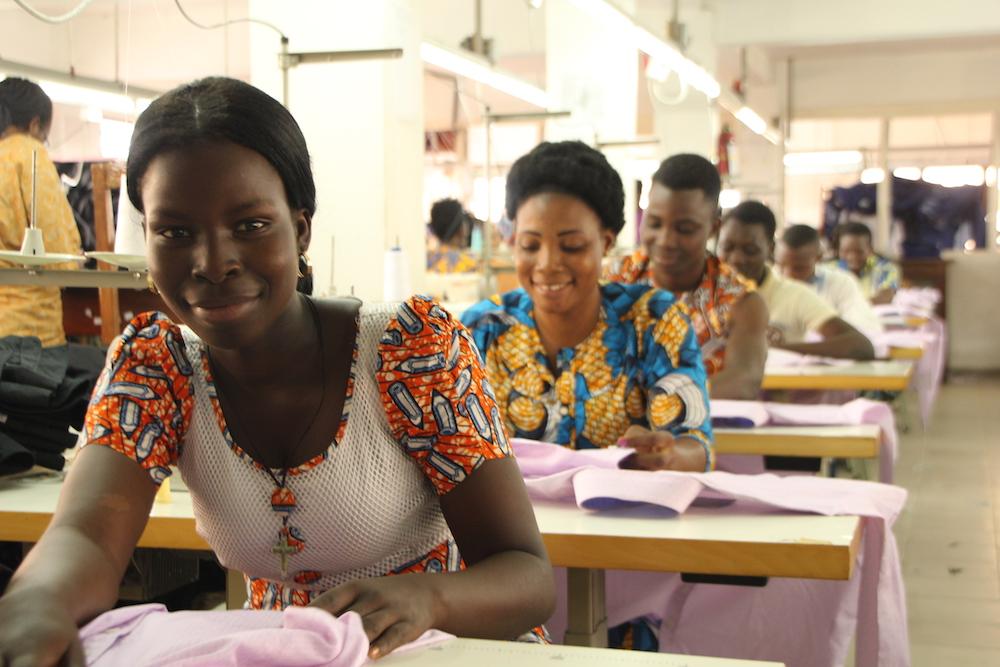Empowering West African Women Through Ethical Manufacturing
Sourcing company supports West African manufacturers to compete in international supply chains and introduce safe and supportive workplace practices for women

ACCRA, January 16, 2019 /3BL Media/ – Sourcing company Ethical Apparel Africa (EAA) has joined Business Call to Action with a commitment to create at least 1,500 ethical manufacturing jobs and develop six African-owned apparel factories in Benin and Ghana by improving workplace standards, linking them to international value chains, and investing in staff wellbeing, by 2023.
Launched in 2008, BCtA aims to accelerate progress towards the Sustainable Development Goals (SDGs) by challenging companies to develop inclusive business models that engage people with less than US$10 per day in purchasing power (in 2015 dollars) as consumers, producers, suppliers and distributors. It is supported by several international organizations and hosted by the United Nations Development Programme (UNDP).
As outsourcing of manufacturing rises and costs of mass-produced goods such as garments, textiles and furnishings decrease, the risk of unethical and exploitative work practices in factories increases. Many of these factories are staffed by persons in forced labour - the International Labour Organization (ILO) estimates that over 24 million people are currently victims of forced labour conditions. Women and girls are disproportionately affected.
With this issue gaining focus globally, EAA focuses on catalyzing a more sustainable growth path for the emerging apparel manufacturing industry in Africa, which is slated to grow rapidly. EAA aims to create ethical manufacturing jobs in West Africa while building a model of manufacturing that prioritizes both profit and people. The company’s founders Keren Pybus and Paloma Schackert met with factory owners in Ghana and Benin who were committed to their workers and communities. They decided to partner with these factories to build their capacity to export high-volume orders, increase production efficiency and create secure, safe jobs that empower, rather than detract.
EAA now works with three high potential factories in Benin, and Ghana and aims to double this by 2023. In 2017, the company facilitated US $350,000 in export orders, and will hit nearly $1 million in exports in 2018.
EAA’s business model combines training, order generation, and impact through the expertise of its on-the-ground team of international and local experts. The company works to improve quality and increase efficiency of its partner factories' workforces, while supporting factory managers to meet international standards and implement beyond-compliance programmes for workers. Ethical Apparel also brings in high-volume international orders from brand partners in the US and the UK. As export business grows, partner factories are required to reinvest a portion of profits into workforce well-being – including working towards living wages, healthcare, educational offerings and other benefits chosen by workers.
Now that Ethical Apparel Africa is a BCtA partner, the company is looking to intensify its activities to create better work environments, stronger industries and more jobs to align with Sustainable Development Goals (SDGs) 5, 8 and 9.
“Our transformative model - increasing efficiency, bringing consistent orders and requiring investment in workers - enables factories to generate impact and profit while keeping product costs competitive. By applying this scalable model we can change how the industry develops on the African continent,” said Ms Pybus.
Paula Pelaez, Head of BCtA, said the forced work situation globally, especially for women and children, was dire, and companies like EAA were crucial to resolving this challenge.
“Ethical Apparel Africa has the opportunity to transform the lives of women in the communities where they work, and we are pleased that they have decided to come on board as a partner for the BCtA program. For the next five years, we will work with them to see how West African manufacturers can gain a larger presence in the global supply chain and create better jobs for their people. I am excited to view their progress and the creation of sustainable jobs that will surely follow from their success.”
For further information:
BCtA: aimee.brown@undp.org
BCtA membership does not constitute a partnership with its funding and programme partners, UNDP or any UN agency.
About Business Call to Action (BCtA)
Launched at the United Nations in 2008, BCtA aims to accelerate progress towards the Sustainable Development Goals (SDGs) by challenging companies to develop inclusive business models that offer the potential for both commercial success and development impact. BCtA is supported by the Dutch Ministry of Foreign Affairs, Swedish International Development Cooperation Agency (Sida), Swiss Agency for Development and Cooperation (SDC), UK Department for International Development (DFID), and hosted by the United Nations Development Programme (UNDP). For more information, please visit www.businesscalltoaction.org.
About Ethical Apparel Africa (EAA)
EAA was founded based on the core belief that all manufacturing can and should be done ethically. In 2015, against the backdrop of rising prices in Asia and industry pressure to find its next manufacturing hub, EAA saw the fundamental advantages West Africa could offer the manufacturing sector: quick shipping times to the US/EU, duty advantages, low cost of living, and labor availability. The business opportunity was clearly there, and the company has now built a model of manufacturing that prioritizes both profit and people. The company plans to create 5,000 high quality manufacturing jobs in West Africa.
